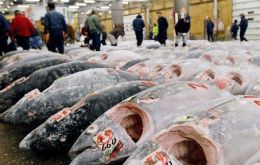MercoPress. South Atlantic News Agency
International
-
Sunday, January 8th 2012 - 05:14 UTC
Spain opens tax evasion “hunting season” and targets 8 billion Euros

Spain’s new Conservative Government announced this week a wide ranging plan against fiscal fraud and tax evasion by which it hopes to recoup over 8 billion Euros for treasury coffers in 2012 alone. And it has also announced it will be engaging countries which have ceased to be tax-havens in order to step up the Government’s efforts against tax evasion in Spain.
-
Sunday, January 8th 2012 - 05:10 UTC
Shrinking sea ice cover in north Canada threatening seal population, says report
Shrinking sea ice cover in the North Atlantic over the past three decades due to warming has led to a “dramatic” spike in deaths among seal pups, a new US study says, offering a glimpse into a population issue while numbers are still abundant.
-
Friday, January 6th 2012 - 07:12 UTC
“Ninja” patrol vessel joins the annual Antarctic dispute with Japanese whalers

The Sea Shepherd flagship ‘Steve Irwin’ was shadowed by a Japanese security vessel as it escorted the badly damaged Brigitte Bardot to Fremantle for repairs, the anti-whaling group says.
-
Friday, January 6th 2012 - 07:10 UTC
Ford launches Brazil designed EcoSport to be marketed in 100 countries

The Brazilian subsidiary of automaker Ford has unveiled a new version of its EcoSport SUV and says it will be sold in close to 100 countries. The car was introduced Wednesday in the Brazilian capital and at the Auto Expo show in New Delhi.
-
Friday, January 6th 2012 - 07:03 UTC
Ten million dollars expected for auction of rare edition of “The Birds of America”

A rare first edition of John James Audubon's sumptuously illustrated “The Birds of America,” depicting more than 400 life-size North American species in four monumental volumes, is going on the auction block for an estimated 7 million to 10 million dollars.
-
Friday, January 6th 2012 - 07:01 UTC
Spanish banks must set aside 50bn Euros to cover ‘toxic’ real estate assets

Spain's Conservative government ruled out a bad bank to deal with toxic property assets, wary of adding more debt to a nation fighting to control its deficit and putting the onus on lenders to make their own provisions.
-
Friday, January 6th 2012 - 06:50 UTC
Message to Iran: UK ready to use military force to keep Strait of Hormuz open

Britain on Thursday signalled its readiness to use military force if necessary to keep the Strait of Hormuz open, warning Iran not to miscalculate over the West's determination to prevent disruption to the key shipping route.
-
Friday, January 6th 2012 - 06:40 UTC
All time record price for a 296 kilos blue-fin in Tokyo market: 712.000 dollars

A deep-pocketed restaurateur has paid more than 700.000 dollars for a tuna at Japan's Tsukiji fish market, smashing the record for a single blue-fin. Bidding on the 269kg fish, caught off the coast of Japan's northern Aomori prefecture, stood at an eye-popping 711.864 dollars when the hammer came down in the first auction of the year.
-
Thursday, January 5th 2012 - 05:08 UTC
EU slower December inflation could be followed by more interest rate cuts

Euro zone inflation eased from last year's peaks of 3.0% in December, the first sign of a fall in price growth this year that analysts expect will create room for more interest rate cuts to help the weakening economy.
-
Thursday, January 5th 2012 - 05:05 UTC
Belgian board member named chief economist of European Central Bank

European Central Bank has named Belgian executive board member Peter Praet as its chief economist following the resignation of Juergen Stark.
